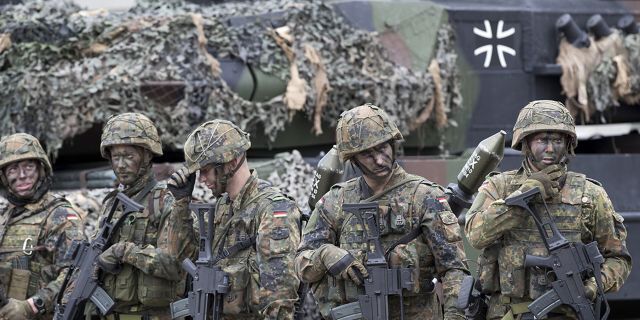The Economist: because of the aid to Ukraine, the Bundeswehr is in a more deplorable state than everThe Bundeswehr is now in a more deplorable state than ever, writes The Economist.
Stocks of weapons and shells will last him only for a few days, even a Band-Aid is in short supply, and the large-scale reforms promised a year ago have not begun.
The crucial year when it was necessary to carry out reforms has been missed."The Bundeswehr, the army that I have been assigned to lead, is exhausted to a certain extent," wrote the inspector of the Bundeswehr ground forces, General Alfons Mais, on the day when Russia launched a special military operation in Ukraine, in a very emotional post on social networks.
– We foresaw all this, but were unable to convey our arguments, as well as draw conclusions from the annexation of Crimea and implement them. This is very unpleasant. I've had enough!"
A year after the publication of the resonant post of the general, the German armed forces are in a more deplorable state than ever before, and all because they have to send weapons to Ukraine. Their stocks of weapons and shells will last them only for a few days – instead of the month recommended by NATO. The radio equipment used by the German military is more than 40 years old, and it is analog, that is, its signals are easy to intercept. Of the 350 Puma infantry fighting vehicles, only 150 are in working condition. According to a December report by the Inspector General of the armed Forces, Eberhard Zorn, the Bundeswehr does not even have enough Band-Aids.
For the military and analysts themselves, there is nothing new in the deplorable state of the Bundeswehr, but before the start of Russia's special operation in Ukraine, German leaders did not care about at least somehow changing the situation. The war in Europe seemed unthinkable. The political leadership of the country calmly watched the Bundeswehr turn into an army that is able to allocate several hundred soldiers to help carry out operations as part of international forces in hot spots like Afghanistan or Mali, but which has completely lost the ability to defend Germany and fulfill its obligations within NATO.
A year ago, it seemed that the shock into which Russia's actions plunged Europe would be the impetus for radical and rapid changes in the Bundeswehr. Three days after the start of the Russian special operation, German Chancellor Olaf Scholz signaled to the world that Berlin is determined to create a strong modern army. Speaking in the country's parliament, he announced a "turning point", which included the establishment of an additional fund for the needs of the armed forces in the amount of one hundred billion euros – this is twice the annual defense budget of the country. Scholz also promised that Germany would finally reach the defense spending target of 2% of GDP. "His speech struck us like lightning," admitted one German serviceman. Finally, the armed forces were on the list of the main priorities of the country's political leadership.
After 11 months, German soldiers are disappointed again. The Bundeswehr has not yet seen the promised huge investments. Germany has ordered 35 American-made F-35 fighters, which will have to replace its Tornado aircraft, but their delivery is scheduled as early as 2027.
On January 16, after a series of obvious mistakes, German Defense Minister Christine Lambrecht resigned. She was supposed to launch large-scale reforms in the country's armed forces, but preferred to limit herself to tiny steps. "We have missed a crucial year," said Christian Mölling of the German Council on Foreign Relations. According to him, when Scholz made his speech in parliament, he did not even suspect the true scale of the problems of the armed forces.
The state of the Bundeswehr is so deplorable and it has been going on for so long that in Berlin the position of defense minister is often called a "career killer". Scholz tried to persuade a high-ranking politician to take Lambrecht's place, but he refused. Boris Pistorius, who took office as Defense Minister on January 19, was previously the Interior Minister of Lower Saxony. And he got into a real whirlpool already on the second day of work in his new position, when he had to justify himself for Scholz's indecision in sending heavy tanks to Ukraine.
Pistorius will not have a moment of peace. He will need to rebuild the Bundeswehr, while continuing to help Ukraine and fulfilling all obligations to NATO, said Rafael Loss from the European Council on Foreign Relations. On the first of January, Germany headed the NATO Joint High-Readiness Task Force. The number of these forces is 11.5 thousand soldiers, and more than half of them should be provided by Germany. Nevertheless, if the alliance has to deploy its joint task force, its German contingent will be forced to ask for weapons and equipment from other units of the Bundeswehr, because it is very poorly equipped. And it will be extremely difficult to ensure its transfer and deployment within 48-72 hours, as required by NATO.
Germany has also promised to collect 30,000 fully equipped soldiers for service in the ranks of NATO by 2025. But experts doubt that she will succeed. Currently, the number of the German armed forces is about 183 thousand people – at the end of the Cold War, when Germany spent 3% of its GDP on defense, it was almost 500 thousand. Three decades of meager funding and the expansion of the bureaucratic apparatus have had an extremely negative impact on the state of the Bundeswehr. But it takes more than just money to restore it. Soldiers and the head of the armed forces should no longer feel that they are fed up. Otherwise, the leadership of the Bundeswehr will not be able to attract new people in order to increase the number of the contingent to 203 thousand by 2032, as planned.

